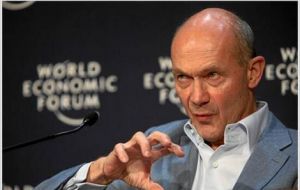MercoPress. South Atlantic News Agency
WTO members to openly discuss an alternative to the failing Doha round
 WTO chief Lamy will be making an evaluation of negotiations so far
WTO chief Lamy will be making an evaluation of negotiations so far The World Trade Organization's 153 member nations will openly discuss for the first time an alternative to the failing Doha round of global trade talks, according to a report from The Wall Street Journal.
The so-called Plan B, to be discussed Thursday and Friday at WTO headquarters in Geneva, would likely eliminate issues that have proved impossible to solve over the 10 years of Doha's existence.
Those points include reaching deals on cutting tariffs on machinery, cars and other industrial goods, and levies on agricultural products. Instead, countries would maintain what they can agree on, such as common customs standards and curbing fishing subsidies.
WTO Director-General Pascal Lamy will present a “lucid, exact evaluation without pretending we don't have this huge problem” on cutting tariffs, according to sources quoted by WSJ
Lamy decided an alternative to Doha might be needed after consulting with all WTO members last week, WTO officials said.
Downsizing Doha to something all countries can swallow would preserve the WTO legitimacy as keeper of the trade rule book and arbiter of disputes between countries and their companies, and keep open the option of a future trade round, say analysts.
Several scenarios will be put up for consideration, according to a trade diplomat familiar with the agenda. One issue all sides agree on, for example, is a treaty on “trade facilitation.” Developing countries often lack the roads, ports and customs offices needed to expand exports. Rich countries increasingly target their aid toward helping to build these facilities. Doha would turn this aid into a treaty obligation.
A Doha failure would be an ominous sign. The last trade negotiation to collapse was the London conference of 1933, say trade historians. The two-week conference, which failed to end the Great Depression, is famous for Nazi economics minister Alfred Hugenberg proposing German colonial expansion in Africa as a cure for the Depression.
With the 2012 U.S. election season approaching, WTO members have resolved to finish the Doha round by the end of this year. Doha, which began in Nov. 2001, was meant to be a “development round,” offering poor and emerging economies more access to U.S. and European Union markets, and thus fighting the poverty that feeds terrorism.
However, the dramatic rise of China, Brazil and India changed the scenario. Suddenly fearful of these new rivals, the U.S. and EU refused to lower barriers to farm imports unless these countries opened their burgeoning markets for industrial goods.
These five trading blocs—without Japan and Canada, which gradually lost their status as trade-talk heavyweights—clashed at summit after summit throughout the decade. They could never make it work and increasingly, trade negotiators are openly confessing the impossibility of success.
“Some of the gaps that we have to bridge, particularly in opening up markets outside of agriculture, in manufacturing and services, are probably not going to be filled in time for us to do it in 2011,” U.S. trade representative Ron Kirk said at a think-tank event in Washington last week.




Top Comments
Disclaimer & comment rulesCommenting for this story is now closed.
If you have a Facebook account, become a fan and comment on our Facebook Page!